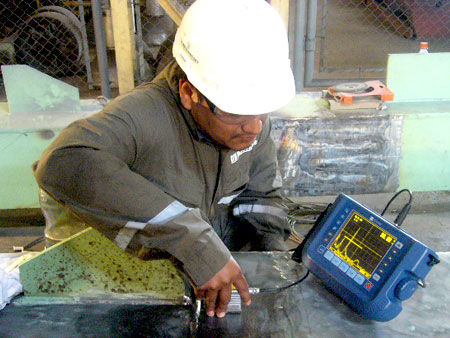
Non Destructive Testing of Pressure Vessel
Why should you conduct a NDT test?- Safety of the Equipment
- Safety of workforce and the Plant.
- We have facilities to conduct any kind of non Destructive Testing of Pressure Vessels, Pressure Plants, Machine Parts, storage vessels, vital equipment etc, under statute or otherwise. We can also conduct vibration monitoring of machines. Continual exposure of an employee to vibration effects his nervous system and mental health and his work performance in the long run and can cause a mental breakdown.


STATIC ELECTRIC CHARGE MONITORING
Why should you go for static charge monitoring and eliminating it.What is Static Electric Charge ? Static electric charge is, whenever two dissimilar materials come in contact, a transfer of electrons takes place from one material to the other. As a result one material acquires an excess of negetive charge and the other metrial acquire an equal excess of positive charge. If two maerials are now separated each will posses an excess of charge and electrostatic charging has taken place. If both materials are conductors, then the high conductivity allows on equalisation of charge to take place, so that no measurable excess charge is present on complete seperation. It is therfore necessary that one of the material is a non-conductor for static charging to occur. When the charging is complete, the excess charge start to equalise themselves. The discharge takes place when the charge density rises and the dielectric (or field) strength reaches its critical value. The discharge is accompanied by a spark and releases energy. If the energy released greater the minimum ignition energy of flammable mixture present at that time, an explosion and fire can take place. We also carry out ststic electric charge monitoring of flammable liquid, gas and solid pipe line, packing material for static electric charge accumulation with imported (Japan make) instrument and suggest discharge method on fire safety point of view.
- Persons wearing nylon underwear and non conductive shoes have been found to accumulate an electric charge of 600 Volts after walking about 20 mtrs.
- Transmission belts at a speed of 3.15 mtrs/sec. can accumulate an electric charge of 25 - 80,000 Volts.
- Benzene flows at high velosity in a steel pipe can accumulate an electric charge of 3,000 Volts.
- Gasoline (petrol) in free fall of pipe can accumulate a charge of 14,000 Volts.
- Gas containing solid particles exhausting at high pressure can accumulate a charge of 9,000 Volts.
- Flange on a steam ejector can be charged up to 15,000 Volts.
- Rolls of paper, unwinding at a speed exceeding 10 mtr/sec. can accumulate a charge of 1,50,000 Volts.
- A rat jumping fast across a dust - laden atmosphere can some time cause a very serious explosion.